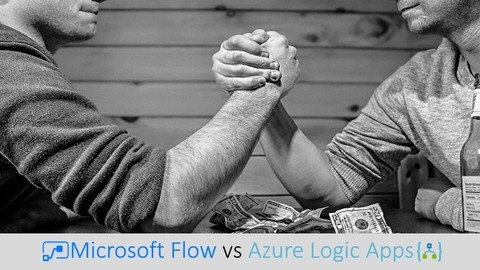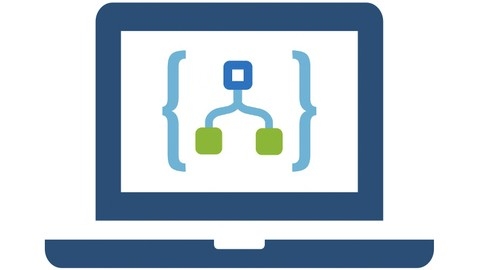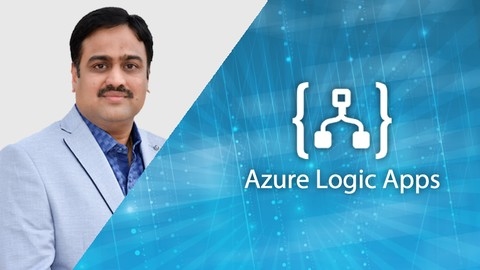Azure Logic Apps are a powerful tool for automating workflows and integrating different systems within the Microsoft Azure cloud.
They can be used to create complex workflows that connect various services, data sources, and applications, streamlining processes and saving you time.
If you’re looking to learn Azure Logic Apps, finding a good course can be daunting.
There are countless options available, but choosing the right one can be challenging.
You want a course that is comprehensive, engaging, and taught by experienced instructors.
Based on our research, the best course overall for learning Azure Logic Apps on Udemy is Azure Serverless Functions and Logic Apps.
This course offers a comprehensive overview of serverless computing, covering the fundamentals of Azure Functions and Logic Apps.
It features practical projects and exercises, enabling you to build your own Logic Apps from scratch.
The course also includes insights into integration with other Azure services like Storage and Cosmos DB, making it an ideal starting point for building robust and scalable serverless applications.
While this course stands out, there are many other quality options available.
Whether you’re a beginner or an experienced developer, we’ve compiled a list of the best Azure Logic Apps courses on Udemy to fit your specific needs and learning style.
Keep reading to explore our recommendations and find the perfect course for you.
Azure Serverless Functions and Logic Apps
This comprehensive course will equip you with the skills to confidently build and deploy serverless applications on Azure.
You’ll start with the fundamentals of serverless computing, then dive into practical implementation with Azure Functions and Logic Apps.
The course goes beyond just coding, showing you how to effectively integrate your serverless functions with Azure Storage, Cosmos DB, and other essential Azure services.
You’ll gain hands-on experience through engaging assignments and live walkthroughs, enabling you to build your own functions and logic apps from scratch.
The curriculum covers crucial aspects of security, ensuring your applications are robust and reliable.
You’ll also explore powerful techniques like messaging and queues, allowing you to build complex and scalable solutions.
Furthermore, this course expands your skillset beyond traditional serverless development.
You’ll learn how to leverage Azure Bots and cognitive services, opening up opportunities for creating intelligent and interactive applications.
Azure Function, Logic Apps & Blob Storage for .NET Developer
You’ll start by diving into Azure Blob Storage, learning how to create and manage storage accounts, upload files, and work with containers and blobs.
The course covers essential concepts like MetaData and SAS Tokens, crucial for securing your data and controlling access.
Next, you’ll explore the world of Azure Functions, learning how to set up projects in Visual Studio, create and deploy functions, and understand different triggers like Http to Queue and Timer triggers.
You’ll see firsthand how to use Functions to handle tasks like resizing images and updating databases, making your applications more dynamic and efficient.
The course then shifts its focus to Logic Apps, the powerful tool for automating workflows and integrating different systems.
You’ll learn to create logic apps, handle events, and use connectors to integrate with other services, like Dropbox.
The course dives into advanced Logic App features like IF Else statements, Switch Case, and loops, giving you the flexibility to create sophisticated and custom workflows.
Finally, you’ll learn about Azure Cache for Redis, a key tool for boosting your application’s performance by storing frequently accessed data in memory.
You’ll learn how to create and configure Redis caches and implement caching in your .NET application, significantly improving the responsiveness and speed of your applications.
Throughout the course, you’ll get hands-on experience using various tools like Azure Portal and Visual Studio.
You’ll also learn about Dependency Injection, a crucial technique for building maintainable and testable applications.
Power Automate vs Azure Logic Apps, which tool should I use?
This course provides a comprehensive exploration of automation using Microsoft Flow and Azure Logic Apps.
You’ll gain a strong foundation in Microsoft Flow, starting with its features, templates, and connectors.
The instructor, Kent, guides you through practical demos to reinforce your understanding.
You’ll discover powerful features like approvals, buttons, notifications, and Maker Analytics, along with techniques for sharing and managing your Microsoft Flow applications.
The course then transitions to Azure Logic Apps, showcasing its features, templates, and connectors for enterprise integration.
You’ll delve into the editing experience, learn about the Enterprise Integration Pack, and gain hands-on experience with inline code.
Kent’s demos effectively illustrate how to manage Azure Logic Apps, including monitoring and governance.
The course then takes a strategic turn, comparing Microsoft Flow and Azure Logic Apps.
You’ll learn to make informed decisions about which tool best suits your specific needs, considering factors like organizational fit, requirements complexity, and scalability.
The course includes real-world demonstrations of both Microsoft Flow and Azure Logic Apps in action, showcasing their practical applications.
Beyond its core content, the course features new content added after its initial release, including advanced topics like securing inputs and outputs in Logic Apps, building chatbots with Power Virtual Agents, and introducing Robotics Process Automation in Power Automate.
This comprehensive approach equips you with the knowledge and skills to leverage these tools for various automation scenarios.
Azure Logic Apps - A practical guide ( Hands-on approach )
You’ll start by understanding the core concepts of serverless computing and workflow automation.
The course then dives into the specifics of Logic Apps, exploring their connectors, triggers, and actions.
This foundation sets the stage for hands-on learning, where you’ll build your first Logic App and gain insight into its inner workings.
The course delves into practical scenarios, demonstrating how to create recurring workflows for retrieving data like weather and traffic information.
You’ll also learn to build Logic Apps that automate processes like loan application processing and service ticket management.
Beyond basic functionalities, the course explores advanced concepts like flow control.
You’ll learn to implement conditional constructs to build a Logic App that moderates images and use looping constructs to process batch transactions.
You’ll also gain experience with nested Logic Apps, enabling efficient batch data processing.
The course concludes with a focus on custom connectors, empowering you to connect your Logic Apps to external systems and create tailored integration solutions.
You’ll also gain an understanding of advanced integration scenarios, including accessing on-premise data using the Enterprise Integration Pack and Integration Service Environment.
This course is well-structured and offers a valuable starting point for anyone seeking to master Azure Logic Apps.
Whether you’re a developer looking to automate tasks or a business user seeking to streamline processes, this course will equip you with the knowledge and skills to leverage Logic Apps effectively.
Introduction to Azure Logic Apps - 2023
You’ll gain a deep understanding of the two primary Azure Logic Apps versions: Standard and Consumption, learning their unique features and when to use each.
The course dives into essential concepts, such as triggers, actions, and dynamic content, demonstrating how to create automated workflows that react to specific events.
You’ll discover how to leverage dynamic content to build flexible and adaptable logic apps.
Hands-on demonstrations throughout the course offer practical application of these concepts.
You’ll build real-world logic apps, learning to configure triggers and actions, and utilizing dynamic content to create robust automations.
The course uses relevant examples to illustrate the real-world power of Azure Logic Apps, showing how you can apply these concepts to your own projects.
Azure Logic Apps - A step-by-step guide for Beginners
You’ll start by building simple logic apps, connecting different services and learning the basics of workflow design.
One of the key skills you’ll acquire is using the “For Each” and “Filter” steps to control the flow of your logic apps.
This is crucial for handling data efficiently and creating logic that adapts to different situations.
You’ll also discover how to seamlessly integrate your logic apps with other services by using an API App, a powerful technique for building custom integrations.
The course culminates by showing you how to leverage Logic Apps for monitoring and analysis.
Imagine setting up automated checks that track website traffic or analyze user behavior, all powered by your Logic Apps.
You’ll learn to build schedules and trigger alerts based on specific thresholds, making sure you’re always on top of your data.
You’ll be well-equipped to confidently tackle real-world automation challenges using the power of Azure Logic Apps.
Azure Logicapps Inside-Out with real-world use case
You’ll start by grasping the core concepts of Logic Apps, including triggers, actions, connectors, and the difference between the old and new designers.
The course then dives into a real-world use case, walking you through the creation of a practical automation step-by-step.
You’ll learn to create triggers and variables, understanding the importance of proper naming conventions and how to utilize variables as parameters.
The course goes beyond basic Logic App functionality, teaching you how to work with HTTP calls to securely access and integrate with REST APIs.
You’ll discover how to create service principles, manage API permissions, and inspect API output.
Security is paramount, and this course emphasizes that by teaching you how to leverage Key Vault with managed identity for secure secret management.
You’ll master the art of working with JSON, parsing it to extract specific data, and efficiently handling errors.
The course guides you through using For-Each loops to iterate through JSON results and extract relevant information, ensuring your automation is robust and accurate.
You’ll delve into the power of conditions and dates, allowing you to create automations triggered by specific timeframes or data points.
The course provides practical examples of formatting dates, checking for specific date conditions, and even sending beautifully formatted emails with HTML tables to keep you informed of your automation’s results.
You’ll learn to enhance your automation by filtering for future expiries, tracking key expiry dates, and even restoring previous versions of your Logic App for easy rollback and management.
It covers essential topics from basic concepts to advanced techniques, providing a solid foundation for building complex and sophisticated automations.
You’ll gain practical skills in JSON parsing, API calls, date manipulation, secret management, and email integration, equipping you with the knowledge to confidently tackle real-world automation challenges.







